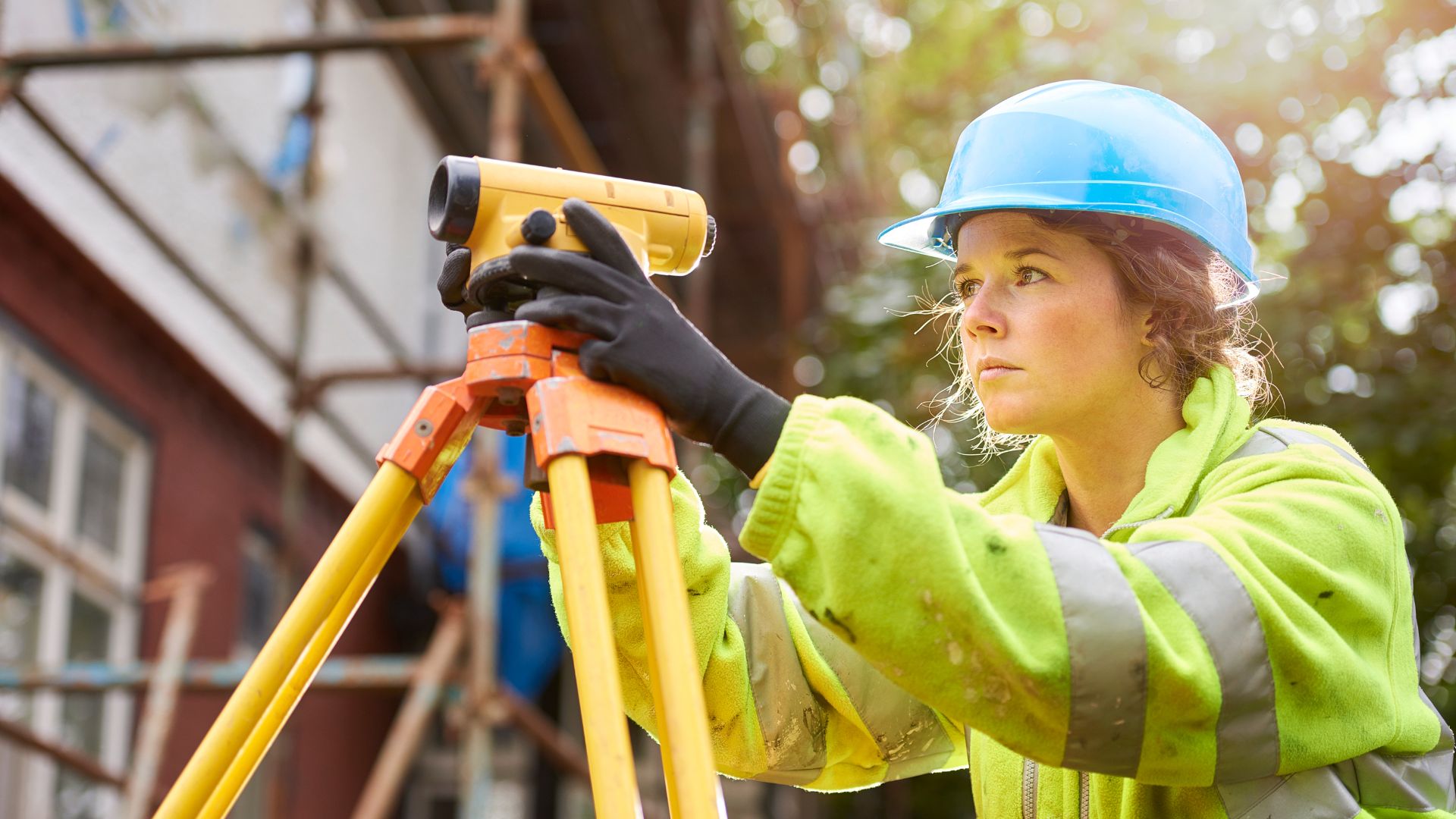Building the Future: Women in Construction
04 Mar, 20241-2 minutes
In this blog, you will learn:
- About the barriers women face in the construction industry.
- What is driving the increase in the number of women in construction.
- How women can improve the construction industry.
- Where the latest construction jobs are and how to apply for them.
4th March to 10th March 2024, is Women in Construction Week, an annual celebration in the UK dedicated to changing the stereotypes that women face in their careers and gives focus to issues such as gender equality in the workplace.
Women in Construction Week brings women together, sheds light on the role they can play in the Construction, Trades and Labour sector and the new opportunities available to them. While figures from the Office for National Statistics show that just 14% of professionals in the construction industry in the UK are women, their contribution to the diverse workforce is increasing.
This Women in Construction Week, we discuss how important it is for women to see construction as an avenue for work and success to build a career for themselves. We’ll explore the barriers and challenges women face, and how the construction industry has seen a shift towards inclusion and is working to promote diversity and increase female representation.
What barriers do women in the construction industry face?
Historically believed to be a male-dominated industry, construction has experienced an overwhelming amount of male workers in the field. Over the decades, women have faced challenges and barriers preventing them from considering entering or progressing in the construction workforce.
The barriers women face in the construction industry:
- Lack of representation.
- Gender bias.
- Gender pay gap.
- Imbalance.
- Lack of flexible working hours.
Lack of representation
When it comes to a career in construction, it is important to consider how the industry is represented to the public. Firstly, there isn't enough material available to young women and girls to promote construction as a real professional path.
The lack of visibility and female role models to encourage women to join the construction sector compounds the lack of new entrants, contributing to the labour shortage. According to Redrow, in 2024, 39% of young people believed construction was dominated by men, compared to 44% in 2020.
The failure to attract more women into the industry can be tackled by including more women in advertisements and increasing visibility to change the face of construction.
Gender bias
The gender bias in construction, typically stems from the stereotype that men are more qualified for the field of construction and engineering. Roles like Carpenters, Bricklayers and Plumbers are stereotypically considered to be better-suited to men due to the physical nature of the work and the need for hands-on labour.
Women have historically been underrepresented in every construction-related field of work and the general view that the industry is male-dominated has meant that women have been less likely to consider a career in construction.
Gender pay gap
The large gender pay gap in construction is yet another challenge women face and can deter women from working in or progressing in the construction sector. Construction has a large gender pay gap partly due to the low numbers of women in the sector.
Women can see the pay disparity as one of the biggest challenges in the construction sector, despite the high earnings potential. According to research by New Civil Engineer and sister title Construction News, on average women occupy just 9.2% of jobs in the highest-paid quartile, while 28.7% are in the lowest-paid quartile.
The biggest construction companies are still struggling to close the gender pay gap, and not much has changed in the last 7 years. The average difference in hourly rate between men and women working in the biggest construction firms is just over 3 percentage points less today than it was in 2017-2018.
Imbalance
The lack of equal representation of men and women in construction is yet another barrier women face when it comes to considering joining or progressing in the industry.
According to Statista, there were approximately 340,000 women employed in the construction sector in the second quarter of 2023, compared to 1.8 million men. Although the number of women construction workers is at a record high, and is set to keep increasing, it is significantly lower than the number of men.
The gender imbalance in the industry means that women are likely to experience adversity and force themselves to work harder to prove their worth, skills and sense of belonging to their colleagues in the construction sector.
Lack of flexible working hours
One of the biggest obstacles for women in most workforces is the lack of flexible working hours. A report from Deloitte found that more women globally left their jobs in 2022 due to inflexible hours. 97% of women believe asking for flexible hours could hurt their promotion opportunities
The lack of quality flexible working opportunities in the construction sector means that less women feel included and their needs represented. There are less opportunities for women to progress in construction, with more women in low-skilled, low-paid roles.
The most common reason for women needing part-time work or flexible hours is to accommodate childcare and balance family life. Women typically work low-paying roles in order to balance their family life with their work life.
The lack of good quality flexible work across the labour market and projects that require working to rigid deadlines, has meant that less women consider a career in construction as it cannot accommodate to their financial needs.
According to the Global Outlook report, a lack of flexibility around working hours is one of the top three reasons women cite for voluntarily leaving their employer in the past year.
What is driving the increase in the number of women in construction?
Having reached a record high in the second quarter of 2023, the number of women working in construction is slowly increasing and having an impact. Misconceptions about gender-specific roles are gradually diminishing with a growing number of women choosing a career in construction. The construction sector is working towards inclusivity and diversity and taking steps towards inclusivity.
Research from Redrow found that three in five (66%) young women already work in, have considered working in or are open to working in construction, up 17% from 2023. The increase in women entering the sector could be attributed to a rise in female role models. A greater representation of women in construction has meant that less people believe that the industry is male-dominated.
Ensuring that women are represented in the sector, and have the opportunity to progress to senior positions encourages more young women to see construction as an environment they can thrive in. According to Redrow, 26% of young women find the opportunity to have a long-term career to be appealing when considering a career in construction and 25% cited the ability to set up their own business later down the line to be an appealing feature.
Construction organisations are encouraging women to apply and enabling a more inclusive and welcoming environment for women now and in the future. They are reaping the benefits of expanding diversity and having women workers in the construction sector.
How can women improve or fix the skills gap in the construction industry?
According to the Construction Industry Training Board (CITB), 250,000 additional workers are needed in the next 4 years to meet UK construction demand in 2027. Way off the target, with fears that the construction skills gap may turn into a crisis, more women in the industry could help fix the skills gap.
The new pool of talent women could provide would address the lack of qualified individuals in the UK construction sector could make it challenging to fill positions, however women can contribute to narrowing the skills gap in the construction industry.
Because of the shortage in the construction industry, those who wish to advance in labour and skills have plenty of opportunities to move forward in the industry. The slow but steady influx of women in the construction industry can help convince women that it is crucial to move forward and that there are opportunities for progression in the industry.
A potential solution could be to increase the number of female construction workers in order to reverse the declining applicant pool and fill the gap. Solutions to these problems include investing in training, promoting diversity, and modernising apprenticeships.
Improving the image of construction to include more diverse representation can be hugely beneficial. The construction industry needs to make the construction industry more attractive to potential entrants and to reach a more diverse pool of candidates.
Construction recruitment services
With years of construction recruitment experience, we support local authorities and private sector organisations all over the UK with their recruitment needs. If you’re struggling to fill a vacancy, why not give us a call on 01772 954200 to see how we can support you?
Construction jobs
Are you looking for a job in the construction sector? Why not visit our job page and take a look at the latest opportunities on offer? Alternatively, upload your CV and one of our experienced consultants will be in touch when a relevant opportunity arises.
Already got an interview lined up? Discover what you should take to an interview and what to do and what not to do in an interview to get ahead of the competition!
Who is Spencer Clarke Group?
Located in the vibrant heart of the North West, we are a dynamic and ambitious recruitment agency with a forward-thinking approach. We’re driven by our commitment to finding candidates the perfect job that has the ability to not only boost their salary, but also improve their mental health, standard of living and better their work life balance.
We operate in two sectors:
In eleven specialisms:
Healthcare, Social Care & Nursing
Corporate Functions & Business Support




